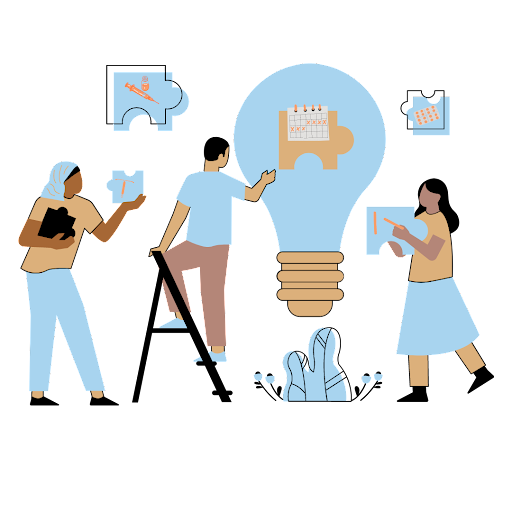In July 2023, as part of the Asia region Learning Circles cohort 3, twenty-two professionals working in various capacities in sexual and reproductive health (SRH) came together to learn, share knowledge, and connect. The goal was to gain insights into ‘what works and what doesn’t’ in meaningfully engaging youth in SRH programs.
“The most wonderful thing was the diversity of the participants… from many countries and many organizations. It was a great platform to learn from others and helped put a lot of things in perspective”
– Participant, Asia LC Cohort
The Knowledge SUCCESS Learning Circles offer global health professionals an interactive peer learning platform for discussing and sharing effective program implementation approaches. This innovative online series is designed to address the challenges of remote work and lack of in-person interactions. Through small group-based sessions, program managers and technical advisors collaborate in supportive discussions to uncover practical insights and solutions for FP/RH program improvement.
Learning Circles enable immersive, interactive and participatory peer-to-peer learning through four structured live sessions on Zoom, along with off-session virtual engagement through WhatsApp including weekly reflection exercises and insights gleaned from curated resources available on collaborative spaces such as FP Insight. The cohort was facilitated by Knowledge SUCCESS in collaboration with the Center for Communication and Change – India.
Participants:
Twenty-two participants were actively engaged in the cohort representing 10 countries including India, Japan, Pakistan, Myanmar, Cambodia, Indonesia, Nepal, Philippines, Laos, and Bangladesh. 60% self-identified as women, 33% as men and 7% preferred not to disclose their gender. Participants also ranged in age – with 33% under the age of 29 – and professional experience spanning from 2 to 25 years.
Participants spent time sharing their primary area of focus while introducing themselves to each other during Session 1. Some of which include:
- Enhancing youth participation and engagement in addressing youth-related issues
- Ensuring equitable access to quality adolescent and youth friendly services
- Implementing peer group education initiatives
- Conducting training of youth advocates and champions
- Exploring the interlinkages between mental health and SRH
To elucidate the concept of meaningful youth engagement (MYE), the participants were introduced to the Flower of Participation framework conceived by CHOICE for Youth and Sexuality. This metaphorical representation, akin to the blooming of a flower, delineated the distinction between meaningful (e.g., informed, given decision-making role, integration of voice) and non-meaningful (e.g., tokenism and manipulation) forms of youth participation.
“……Young people should not only have a seat at the table but a say at the table.” “…Youth leaders 5 years back are still representing the same platform….there should be a guideline for youth leaders to be replaced after three years to allow new leaders to emerge….”
– Participants, Asia LC Cohort
What works:
During the second LC session, participants delved into the knowledge management techniques of Appreciative Inquiry and 1-4-ALL. This prompted them to reflect upon and share successful practices from their past or ongoing experiences that have significantly contributed to MYE in SRH projects and programs.
Through individual introspection, collaborative group exercises, and plenary discussions, a set of recurring themes emerged regarding what works:
- Involving youth in program design and leadership, giving them a voice;
- Harnessing digital technology such as mobile apps, and augmented reality for tracking, counseling, and access to information;
- Investing in youth potential and innovation for sustaining and growth;
- Addressing mental and emotional well-being by including youth counselling, psychosocial support alongside physical health efforts;
- Use evidence-based approaches such as collecting data, tapping into local knowledge and resources, analyzing access to SRH services, and shaping strategies accordingly;
- Fostering trust through non-judgmental, private spaces that enable open dialogue to share experiences and concerns;
- Prioritizing youth engagement and perspectives aligned with real needs of adolescents and youth such as addressing genuine concerns and needs in FP and SRH;
- Leveraging community networks for engagement;
- Transparent processes and a consortium approach
These common themes collectively illustrate a holistic approach to engaging adolescents and youth in AYSRH programs, emphasizing their active involvement, empowerment, skill development, and leveraging innovative technologies, aligning strategies with actual needs and collaborative partnerships, implementing transparent and innovative approaches to effectively address adolescent and youth SRH concerns.
Challenges/What Could Be Improved:
In Session 3, as a means to tackle challenges and setbacks in achieving MYE and AYSRH, the Troika Consulting peer-to-peer knowledge management approach was adopted. Participants were organized into groups of three or four, and using Google Jamboards participants took turns in describing a current challenge within their respective projects and programs. They then sought immediate advice and insights from their fellow group members to address these challenges. Some of the challenges and potential solutions are outlined below:







